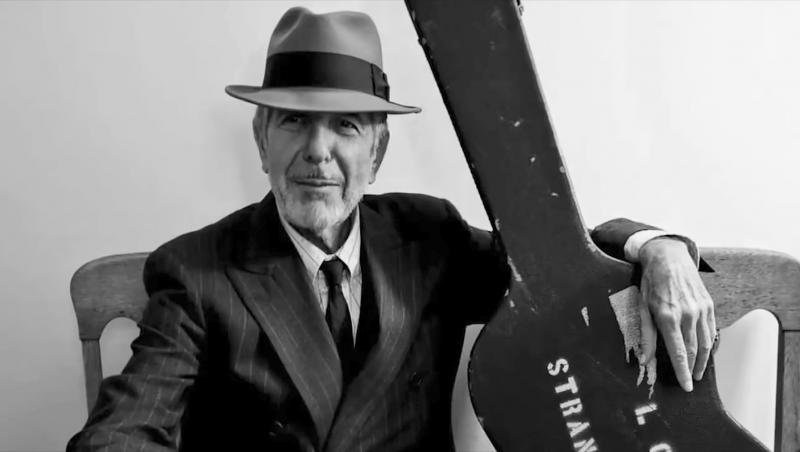Leonard Cohen was deep in his career when he finally finished Hallelujah. Well, the first version of Hallelujah — there would be many, many versions when all was said and done. He’d toiled on the lyrics for seven years. Yet when he submitted the album, Various Positions, to his longtime record company Columbia Records in 1984, the company’s president Walter Yetnikoff decided not to release it in the US. What would become Cohen’s seminal anthem was dead on arrival.
But in the new documentary Hallelujah: Leonard Cohen, A Journey, A Song, in theaters Friday, directors Dayna Goldfine and Dan Gellar examine how despite the odds, the song managed to take on a life of its own thanks, in varying degrees, to Bob Dylan, John Cale, Jeff Buckley and Shrek. Yes, Shrek. Now, four decades after its initial recording, it’s downright ubiquitous, a regular feature in movies, television shows, and singing competitions around the world.
It’s an interestingly stitched together film that starts at the end — his final performance in 2013, singing Hallelujah, of course — and rewinds to the beginning of his songwriting career to trace how he got there. It feels, in some ways, like two different films: The first part is a standard biographical documentary that then shifts focus to Hallelujah’s resurrection outside of Cohen, before finally turning attention back to Cohen and his triumphant final tour. As the title says, it is a journey and a long one at that.

Photo: AP
The filmmakers are enamored of their eloquent subjects, from Judy Collins and composer/arranger John Lissauer to a childhood friend and his rabbi Mordechi Finley. One of the main voices is journalist and author Larry “Ratso” Sloman who interviewed Cohen many times over 30 years and whose tapes of those interviews are used to let Cohen speak for himself. The archival footage, too, is pretty extraordinary and elegantly paired with Cohen’s music throughout.
Much of the film is devoted to chronicling Cohen’s own spiritual journey and his evolving relationship with his Jewish faith, from his poetry to his later years at a zen center atop Mt Baldy. Singer Regina Spektor marvels about his graciousness at his Coachella performance in 2009, saying that it was like Cohen was teaching the audience how to be good.
And yet, for all the talk about and praise for his seeking, this is a film that seems completely uninterested in the fact that he’s the father of two children. We see photos of them as babies with their mother during an offhanded mention that his family was breaking up. A reporter mentions the kids later, but only in context of clarifying that their mother Suzanne Elrod was not in fact the woman he was singing about in Suzanne.

Photo: AP
There could be many reasons for this, including possibly honoring the wishes of his grown children, or wanting to focus on the work. But the absence of any acknowledgement makes this attempt at a deep, holistic portrait of Cohen feel incomplete at best. There is more time devoted to explaining the aesthetics of Shrek than his relationship with his kids.
Or maybe they just weren’t really part of the path to Hallelujah, though his daughter did have a child with Rufus Wainwright, who is responsible for one of the more famous covers of the song, featured on the wildly successful Shrek soundtrack.
A lot of credit for the prolonged life of the song is given to Shrek. Even though movie soundtracks have diminished somewhat in cultural currency, it is hard to underestimate the power of hearing a great song for the first time in a movie.
It is interesting, though, that it seems to have been John Cale’s cover that became the most influential. He stripped down the arrangement, took to the piano, belted out the lyrics and turned Hallelujah into a melodic anthem. Jeff Buckley even said that though Cohen wrote the song, it was Cale’s version that he was covering. No one, it seems, from Brandi Carlile to Bono to Eric Church, is out there singing Cohen’s version.
In one interview, after Hallelujah placed No 1 (The X Factor contestant Alexandra Burke), No 2 (Jeff Buckley) and No 36 (Cohen) in the UK in 2008, Cohen said he thought “People ought to stop singing it for a little while.” Sloman believes he was kidding, but it hardly even matters at this point. The song became bigger than Cohen and seems destined to live on in the culture for years to come.
Hallelujah: Leonard Cohen, A Journey, A Song, a Sony Pictures Classics release in theaters Friday, is rated PG-13 by the Motion Picture Association for “brief strong language and some sexual material.” Running time: 115 minutes.

The unexpected collapse of the recall campaigns is being viewed through many lenses, most of them skewed and self-absorbed. The international media unsurprisingly focuses on what they perceive as the message that Taiwanese voters were sending in the failure of the mass recall, especially to China, the US and to friendly Western nations. This made some sense prior to early last month. One of the main arguments used by recall campaigners for recalling Chinese Nationalist Party (KMT) lawmakers was that they were too pro-China, and by extension not to be trusted with defending the nation. Also by extension, that argument could be

Aug. 4 to Aug. 10 When Coca-Cola finally pushed its way into Taiwan’s market in 1968, it allegedly vowed to wipe out its major domestic rival Hey Song within five years. But Hey Song, which began as a manual operation in a family cow shed in 1925, had proven its resilience, surviving numerous setbacks — including the loss of autonomy and nearly all its assets due to the Japanese colonial government’s wartime economic policy. By the 1960s, Hey Song had risen to the top of Taiwan’s beverage industry. This success was driven not only by president Chang Wen-chi’s

Last week, on the heels of the recall election that turned out so badly for Taiwan, came the news that US President Donald Trump had blocked the transit of President William Lai (賴清德) through the US on his way to Latin America. A few days later the international media reported that in June a scheduled visit by Minister of National Defense Wellington Koo (顧立雄) for high level meetings was canceled by the US after China’s President Xi Jinping (習近平) asked Trump to curb US engagement with Taiwan during a June phone call. The cancellation of Lai’s transit was a gaudy

The centuries-old fiery Chinese spirit baijiu (白酒), long associated with business dinners, is being reshaped to appeal to younger generations as its makers adapt to changing times. Mostly distilled from sorghum, the clear but pungent liquor contains as much as 60 percent alcohol. It’s the usual choice for toasts of gan bei (乾杯), the Chinese expression for bottoms up, and raucous drinking games. “If you like to drink spirits and you’ve never had baijiu, it’s kind of like eating noodles but you’ve never had spaghetti,” said Jim Boyce, a Canadian writer and wine expert who founded World Baijiu Day a decade